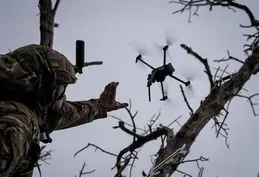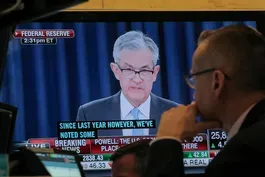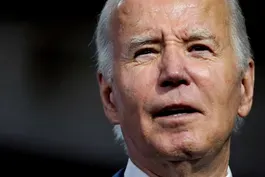
The self-driving safety concerns that led to Tesla recall
Clip: 12/13/2023 | 5m 21sVideo has Closed Captions
The self-driving safety concerns that led to Tesla's recall of 2 million cars
Tesla has recalled 2 million cars, nearly all of its vehicles sold in the U.S. since 2012, because of issues with its self-driving features. Safety regulators have investigated nearly a thousand crashes involving Tesla's autopilot system, which can fully take over steering, braking and acceleration. William Brangham discussed the recall with Faiz Siddiqui of The Washington Post.
Problems with Closed Captions? Closed Captioning Feedback
Problems with Closed Captions? Closed Captioning Feedback
Major corporate funding for the PBS News Hour is provided by BDO, BNSF, Consumer Cellular, American Cruise Lines, and Raymond James. Funding for the PBS NewsHour Weekend is provided by...

The self-driving safety concerns that led to Tesla recall
Clip: 12/13/2023 | 5m 21sVideo has Closed Captions
Tesla has recalled 2 million cars, nearly all of its vehicles sold in the U.S. since 2012, because of issues with its self-driving features. Safety regulators have investigated nearly a thousand crashes involving Tesla's autopilot system, which can fully take over steering, braking and acceleration. William Brangham discussed the recall with Faiz Siddiqui of The Washington Post.
Problems with Closed Captions? Closed Captioning Feedback
How to Watch PBS News Hour
PBS News Hour is available to stream on pbs.org and the free PBS App, available on iPhone, Apple TV, Android TV, Android smartphones, Amazon Fire TV, Amazon Fire Tablet, Roku, Samsung Smart TV, and Vizio.
Providing Support for PBS.org
Learn Moreabout PBS online sponsorshipsold in the U.S. since 2012, because of# issues with their self-driving features.
Over the last two years, U.S. safety regulators# have investigated nearly 1,000 crashes involving## Tesla's autopilot system, which can take over# fully steering, braking and acceleration.
A Washington Post report found about 40# of these crashes were fatal, including## eight where autopilot was engaged on roads# where it was not supposed to be used at all.
Washington Post reporter Faiz Siddiqui was one# of their journalists who did this analysis.
Faiz Siddiqui, thank you so much for being here.
WILLIAM BRANGHAM: So there's# this enorm Can you tell us a little bit# about what regulators and ow n reporting found was the problem with this# self-driving aut FAIZ SIDDIQUI, Technology Reporter, The Washington# Post: So what regulators have found here is that## Tesla autopilot is essentially able to activate# This was the subject of a Washington Post report# over the weekend.
We found there were eight deadly## crashes or serious crashes in which autopilot# was activated on a road that was not the type## of highway, on-ramp to off-ramp, think of an# interstate, in which it was designed to be used.
So there are these locations of what# the regulators call foreseeable misuse,## where someone could abuse the software by# activating it, say, on a long and winding## road with a lot of intersections, any# kind of residential city surface street,## where this is really intended -- think about# cruise control -- or an interstate highway## or at least a highway with clear demarcated lane# lines, exits, a center divider or what have you.
WILLIAM BRANGHAM: You focus in# particular on one 2019 crash in Florida,## a man named Jeremy Banner, where he used# autopilot on one of these roads that were describing as not appropriate for autopilot.
Can you explain what happened in that case?
FAIZ SIDDIQUI: Yes.
a gentleman named Joshua Brown.
In the# Banner crash, a car was traveling down## a U.S. highway when it barreled into and# under a semitruck.
Banner was killed.
The## truck was obviously pulling out of a side# street as Banner's car was driving along.
And the car actually didn't come to a# stop until hundreds of feet later.
So## this was one of the early instances of autopilot# activated in a location where you're wondering,## why is this working somewhere a# truck could be pulling into?
That## does not seem like a controlled access highway.
And it also raised this question of,## is autopilot struggling to s WILLIAM BRANGHAM: I mean, Tesla in its defense# says every time a driver accesses autopilot,## it gets this warning that you're# supposed to keep your hands on## the steering wheel and stay# alert to jump in But there's really no way to enforce# that a driver does that, right?
FAIZ SIDDIQUI: There is a way.
I don't# know if there's a regulatory will.
NHTSA has said it's an issue that is# complex, resource-intensive.
The regulator## would essentially have to impose a sort of a# restriction that it doesn't want to be seen## as imposing, as opposed to having voluntary# compliance, which is where Tesla is saying,## hey, it is your responsibility to activate# autopilot in a location in which it is safe.## We are not going to overburden you with# restrictions, because the so-called -- the## magic of the feature is that it makes# it feel like the car is driving itself.
Of course, it is not a self-driving car.
So# it's more of a question of regulatory will and,## I suppose, what sorts of restrictions# the company is willing to impose.
WILLIAM BRANGHAM: I mean, some critics# of the government have argued that to## allow these 4,000-to-5,000-pound vehicles to# have Do those critics believe that this# current step is appropriate or sufficient?
FAIZ SIDDIQUI: I have spoken with# a lot of people in this space,## and I would say that the critical analysis of# this, and especi OK, let's ensure that this is not lip service to# the idea that Tesla does something.
Let's ensure## that Tesla actually does restrict the software# to the conditions for which it has been designed.
So one potential vein of criticism here# is that NHTSA has now issued a recall.## It is a voluntary recall.
The ball is now in# Tesla's court to impose those restrictions,## which might come in the form of notifications,# warnings, but they aren't going to be,## like -- they aren't going to fully restrict# the software from operating in these locations.
WILLIAM BRANGHAM: All right, Faiz Siddiqui# of The Washington Post, thank you so much.
FAIZ SIDDIQUI: Thank you.
COP28 nations agree to transition from fossil fuels
Video has Closed Captions
Nations at COP28 agree to transition away from fossil fuels, but loopholes remain (6m 27s)
Drone warfare transforms battle between Ukraine and Russia
Video has Closed Captions
How drone warfare has transformed the battle between Ukraine and Russia (7m 51s)
Federal Reserve suggests it may cut interest rates in 2024
Video has Closed Captions
Interest rates remain unchanged, but Federal Reserve signals cuts coming in 2024 (5m 32s)
Impeachment expert breaks down House GOP inquiry into Biden
Video has Closed Captions
Impeachment expert Michael Gerhardt breaks down House GOP inquiry into Biden (10m 53s)
Israeli troops meet renewed resistance from Hamas in Gaza
Video has Closed Captions
Israel meets renewed resistance from Hamas amid pressure to reduce civilian casualties (9m 50s)
Providing Support for PBS.org
Learn Moreabout PBS online sponsorshipMajor corporate funding for the PBS News Hour is provided by BDO, BNSF, Consumer Cellular, American Cruise Lines, and Raymond James. Funding for the PBS NewsHour Weekend is provided by...
















